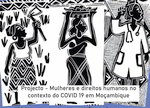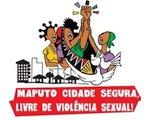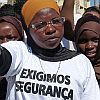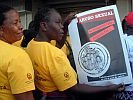Press clippings
Press Attack Approval of the Law on Domestic Violence
by Maria José Arthur
On 29 June 2009 the Assembly of the Republic approved, in general, the Law on Domestic Violence against Women. The reaction of the local press was very negative. These comments refer to two articles that appeared in Canal de Moçambique on the 29th and 30th of June and were published in “Canal de Moçambique” on the 7th of July.
On 30 June, announcing approval of the Law on Domestic Violence against Women, the newspaper Canal de Moçambique contained an article by its journalist Borges Nhamirre, entitled “Law on Domestic Violence transforms every man into the devil“, in an attempt to show that the law was unconstitutional and biased. He argued that just as a man hits his wife so a wife also hits her husband, completely ignoring the level of power present in marital and family relations. In other words, even if some women do in fact attack their companions, the assault is not comparable, because it does not take place in a permanent climate of violence and domination. For this to happen, women would in fact need to have power over their husbands and companions.
This whole discussion leads us to an article on 29 June “Jealousy in Chibabava leads husband to knife his wife and affect her intestines”. Reading the article we learn that:
- The victim, called here “the wife”, is a 15 year old child, an orphan, whose uncles forced her to marry when she was 11 years old;
- The “husband’s” aggression was constant and on a previous occasion he had torn off one of her ears;
- The victim never “wanted” to denounce the aggressor;
- The minor is seriously ill and may die.
Here we have a tragic example of the need to pass a law protecting women from the violence and torture they often suffer at the hands of their husbands or companions, with society’s approval. In this case one only has to look for someone who stood up to defend this child when she was 11 years of age and handed over to a much older man to be his sex slave (I cannot call the forced union with a minor “marriage”!)? Who said anything when she was being constantly brutalised, including severely mutilated? And this violent relationship lasted four years! The poor child, who will probably not survive, certainly spent her life convinced that her role was just to suffer in silence. It was for this reason, and because she would most certainly suffer reprisals, that she did not “want” to denounce, and not a single adult did it for her.
When South Africa decreed positive discrimination in various areas in order to correct the historical injustice that put the country’s black population in an inferior position in terms of access to national resources, we all agreed. But when a law tries to compensate for the historical injustice that is a woman’s lack of power in the family, this is not acceptable. Why? Maybe because discrimination based on sex is considered more acceptable than discrimination based on race. No one dares say that he/she is a racist because social censure would be immediate. But it is common to hear people defending the continued male leadership of the family and the subordination of women, and this almost always results in conspiratorial smiles from those present. Need I say more?
In conclusion, I would like to reaffirm that the law now approved is fundamental for giving women citizens the environment of security and peace they need in order to enjoy their citizenship rights, just like any other national citizen. No more, no less. Let all women have the right to their physical integrity and their dignity. A country is built with free male and female citizens.
* * *







 Information in English
Information in English



















